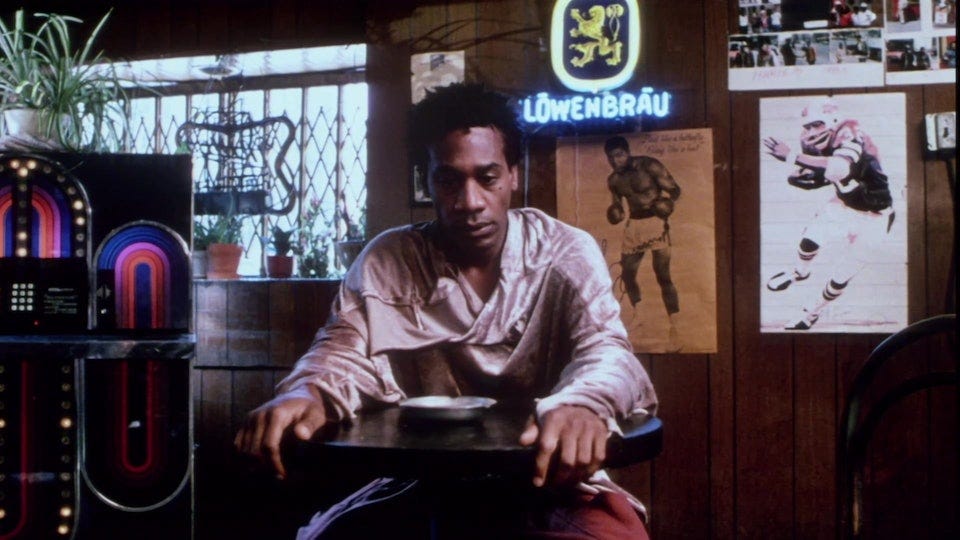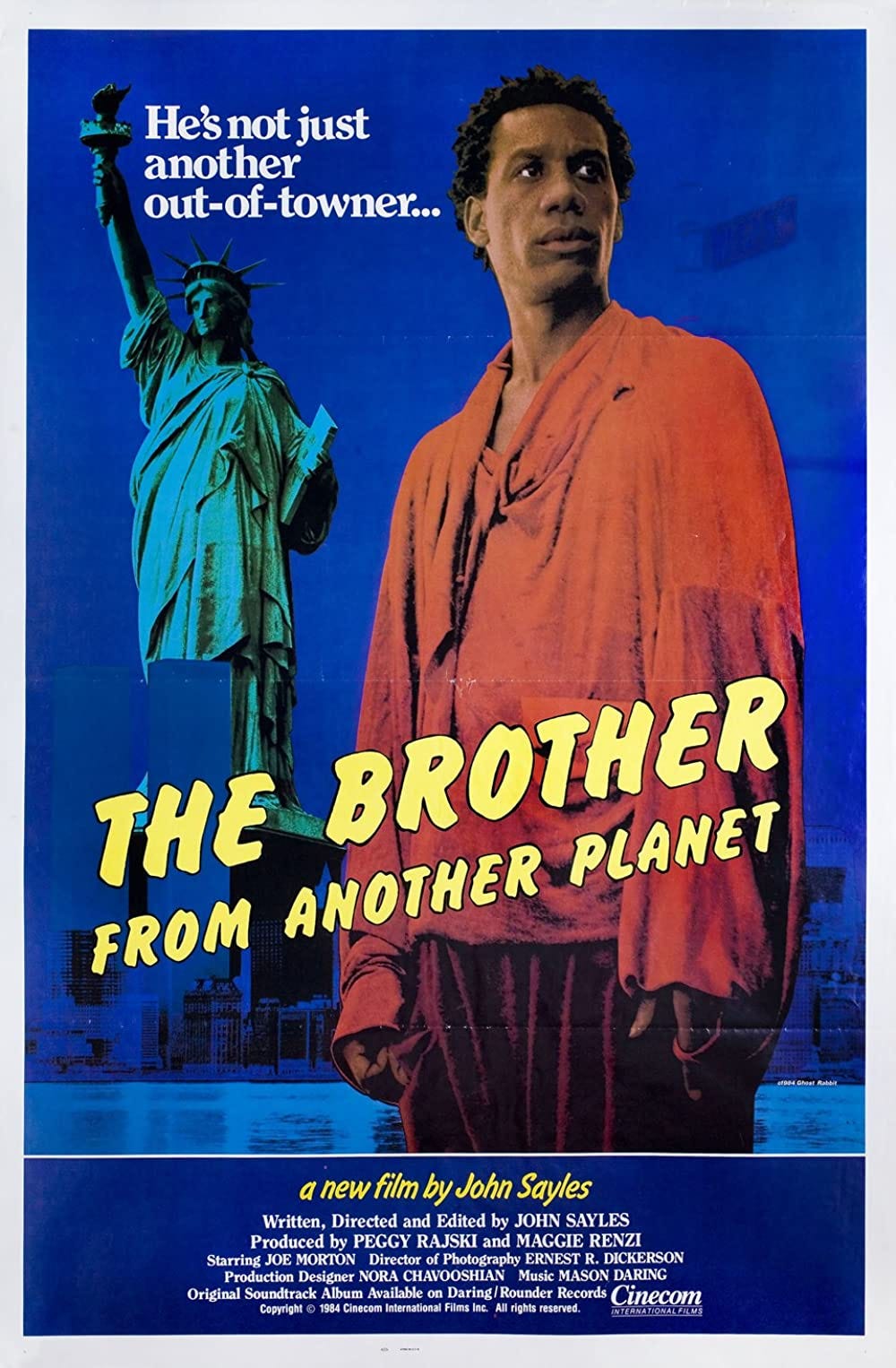We Should Talk About The Brother From Another Planet (1984) When We Talk About Film Authorship
Welcome to the third installment of my January series inspired by my own creative laziness! As you might’ve guessed by now if you read the first two issues from this month, I’ve just wrapped up the third week of my film class at Birmingham-Southern College, and I’m treating you, reader, to some insights on the films we’ve been watching. This week, we covered horror and sci-fi films from the 80s and 90s, including RoboCop, The People Under The Stairs, and today’s film, The Brother From Another Planet. (We didn’t have class on Monday because BSC honors MLK Day.) This film rules and you should watch it. Allow me to elaborate…
There’s an ongoing conversation about who is “allowed” to make films about certain subjects and certain people. It’s a conversation that I—as a straight white man who is socially privileged in almost every possible way—do not interject myself into. But it’s one that I am always eager to observe because I find it fascinating.
I think it makes a lot of sense that films dealing with certain experiences are largely told by filmmakers who have innate familiarity with those experiences. But if you know anything about movies (or society), you know that this has not always been the case. Many older films are reevaluated with this notion in mind, appreciated at a distance and sometimes partially dismissed because they “would’ve been made differently today.”
The Brother From Another Planet, from what I’ve observed, is not one of those films that gets partially dismissed.* A white director—John Sayles—tackled not just a story about a Black protagonist but a story about how Blackness is perceived in America. Which is a bold swing for any director, but especially a white one.**
Here’s lead actor Joe Morton, who plays the titular brother, on Sayles: “John is a social commentarian. The film takes us into a world most white people would not normally enter. …It talks about people who have talents and no outlets for those talents due to oppression and racial prejudice.”***
Morton, who also says that “John is greatly responsible for putting [his] career on the map,” probably has a fondness for Sayles; they’ve worked together on three films.**** But I wonder if Morton puts their working relationship squarely in the context of the time period, given that he probably didn’t work with many Black directors.***** (His last collaboration with Sayles, Lone Star, was released in 1996.) Sayles was progressive for his time (or for any time, frankly), but things certainly were different then.
So The Brother From Another Planet feels like one of those curious cases where it’s both sides of the coin. Today, of course, the production would go differently (i.e. greater representation in the above-the-line crew), but as far as I’m concerned, the content of the film would have largely been handled in the same manner. There are no glaring character flaws, no cringeworthy lines of dialogue, no story choices that “didn’t age well.” It’s a film that absolutely works and gets better every time I see it.
And I think that’s because Morton, as the titular protagonist, deserves some credit for authorship here. His unnamed character is an alien who crash-lands on Ellis Island (symbolism!) and must wander around New York City to avoid being captured by extra-terrestrial (white) bounty hunters. His character is also mute, which not only means Morton acts his ass off in this film, but I imagine he and Sayles were forced to have a very collaborative dynamic rather than sticking to the lines on the page. (Since, you know, there were no lines on the page.)
Morton himself echoes this in that same interview, which was given more than 20 years after shooting this film: “When we did The Brother From Another Planet, John wanted actors who could take care of their own emotional life within the film. He wasn’t interested in background stories or how the actor got from A to B. He no longer holds that opinion. He goes as far as providing a background for you.”****** Sounds to me like Sayles gave Morton a significant level of input for his character. And I reckon it made the film much better than it would’ve been otherwise.
Again, I’m no expert here, but maybe Sayles and Morton’s working relationship offers a roadmap for other creators that are telling stories that don’t reflect their own backgrounds. In recent years, since this conversation has been ongoing at a higher volume, we’ve seen white directors like Craig Brewer, Margaret Brown, and Theodore Melfi direct films about Black characters and Black experiences and receive critical acclaim. Maybe those directors just listened to their producers and their actors instead of being auteurs and/or assholes. That sort of thing can go a long way in this industry.
*This is, perhaps, because not enough people have seen it. It’s streaming a few places, and was featured on the Criterion Channel a year ago, but I had to track down a really cheap-looking used DVD for my class because there’s apparently not a blu-ray release at all.
**It should be noted, I think, that Sayles hired famed cinematographer Ernest Dickerson—a film school classmate of Spike Lee’s who had recently shot Lee’s student film Joe’s Bed-Stuy Barbershop: We Cut Heads—to shoot this film. Dickerson would go on to shoot most of Lee’s early features (and direct many of his own), but The Brother From Another Planet was his first feature film gig.
***Citing my source here because it’s the proper English major thing to do: This interview comes from Science Fiction Cinema by Christine Cornea, one of the two textbooks I assigned for this class. It’s a great read!
****The Brother From Another Planet was their first collaboration and the biggest role Morton played in one of Sayles’ films. (The other two are City Of Hope and Lone Star.) Honestly, I’m not sure Morton ever got a meatier role to play than this one.
*****My editor John asked me to do some “cursory research” here but I told him I was too busy.
******That’s four quotes from the textbook in today’s newsletter. Am I emphasizing the value of referential texts as an instructor of young minds, or am I simply letting someone else’s words take up a fifth of my word count? Who’s to say?
The Brother From Another Planet is now streaming on AMC+, Tubi, DirecTV, Fandor, and Pluto TV, and it is available to rent elsewhere.



